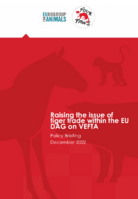
Raising the issue of EU-bred tigers exported to Vietnam
New brief explores the connection between tiger breeding in the EU and consumption within Vietnam.
This December Four Paws and Eurogroup for Animals released a new policy brief entitled, ‘Raising the issue of tiger trade within the Domestic Advisory Group on EU-Vietnam FTA.’ While domestic and international trade in wild tigers for commercial purposes is prohibited in Vietnam, the EU breeding of tigers means trade is highly active.
Today there are less than 4,000 tigers in the wild, in part, due to the demand from South East Asia for tigers and their parts. The EU contribution stems from a lack of transparency and traceability between Member States. Further, the inconsistency between legislation across the EU makes it difficult to monitor both captive-bred and wild tiger populations.
The exact scale of the illegal trade in tigers is unknown. However, between 1999 and 2016 it was estimated 1,412 live tigers were legally exported from Europe with Vietnam being the second largest recipient.
This new brief invites the EU Domestic Advisory Group under the EU-Vietnam free trade agreement (EVFTA) to:
- Examine the tiger trade
- Discuss implementing appropriate measures to reduce wildlife trafficking
- Investigate tiger traders
- Audit all captive tigers
- Phase out tiger farming
While ambitious, such cooperation could have a significant impact on the health of wild tiger populations and potentially help reduce illegal trade. The new brief makes clear tiger farming has not alleviated the harm to wild tigers, indeed it is now believed by experts that wild tigers are extinct in Vietnam. Cooperation under EVFTA is voluntary, therefore Four Paws will continue advocating to the protection of tigers and encourage transnational cooperation.


